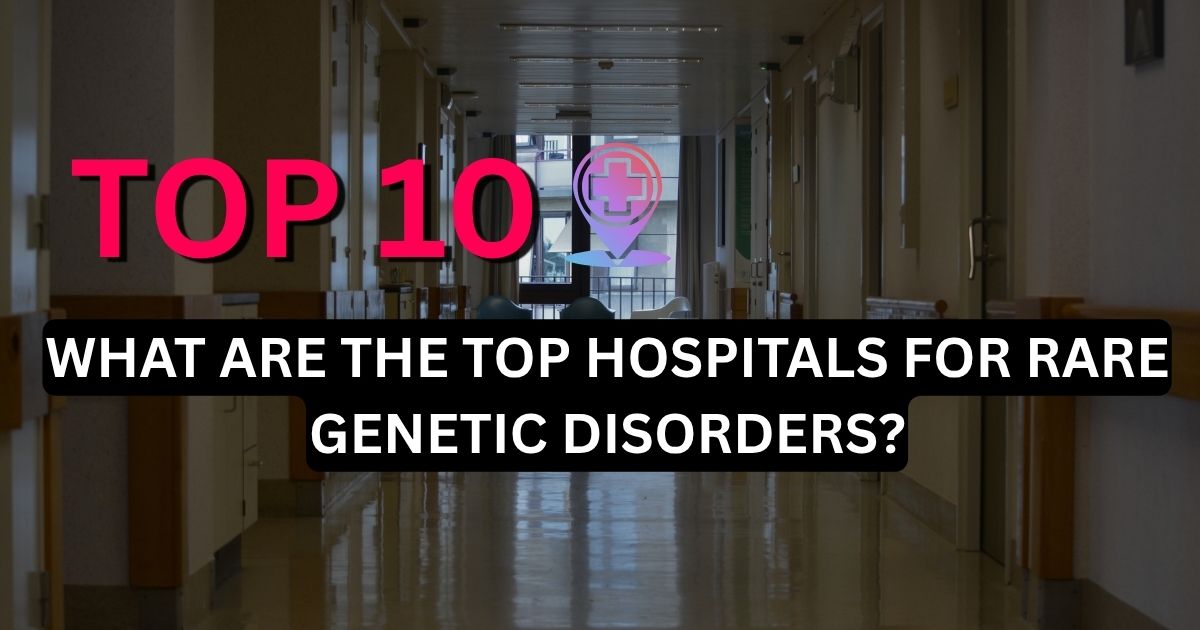Top Hospitals for Rare Genetic Disorders – Rare genetic disorders can be some of the most challenging health conditions to diagnose and treat. These conditions affect a small percentage of the population but require highly specialized care, advanced diagnostics, and multidisciplinary treatment teams.
Whether it’s Duchenne muscular dystrophy, Spinal muscular atrophy (SMA), Hemophilia, Cystic fibrosis, or ultra-rare syndromes like Progeria, patients and families often find themselves traveling across the country — or even the world — to access the best expertise.
In this detailed guide, we’ll explore some of the world’s best hospitals for rare genetic disorders, their unique strengths, what makes them stand out, and how you can choose the right center for your loved one’s care.
Understanding Rare Genetic Disorders
A rare disease is typically defined as one that affects fewer than 200,000 people in the US (or less than 1 in 2,000 in the EU). Many of these diseases are genetic, passed down through family lines due to mutations in DNA.
Key challenges with rare genetic disorders:
Limited awareness among general practitioners.
Complex diagnostic processes that need advanced genomic testing.
Specialized treatment options like gene therapy, enzyme replacement, or bone marrow transplants.
Lifelong management involving multiple specialists.
That’s why choosing a hospital with expertise in genetic medicine, research capabilities, and family support is so crucial.
What Makes a Hospital the Best for Rare Genetic Disorders?
When evaluating hospitals for rare genetic conditions, look for:
- Dedicated Departments of Medical Genetics or Genomic Medicine: Not all big hospitals have this. A specialized genetics unit means a team of geneticists, counselors, molecular biologists, and pediatric specialists.
- Access to Advanced Genetic Testing Labs: Whole exome sequencing, whole genome sequencing, chromosomal microarray — these are not standard at every hospital.
- Participation in Clinical Trials: For many rare disorders, cutting-edge treatments may only be available through ongoing clinical trials.
- Multidisciplinary Care Teams: For conditions that affect multiple organ systems, you need cardiologists, neurologists, pulmonologists, therapists — all working together.
- Strong Patient Support Programs: Genetic counseling, family education, and mental health support matter just as much as the treatment itself.
Top Hospitals for Rare Genetic Disorders: Global Leaders
Below is a list of some of the most respected hospitals worldwide for rare genetic diseases — based on reputation, research, clinical trials, and patient feedback.
1. Mayo Clinic (Rochester, USA)
Why It Stands Out:
Mayo Clinic has an internationally renowned Department of Clinical Genomics. Their Center for Individualized Medicine offers some of the most advanced genomic sequencing and customized treatment plans for rare inherited diseases.
Key Highlights:
- Whole genome sequencing for undiagnosed conditions.
- Expertise in neuromuscular genetic disorders.
- Dedicated hereditary cancer clinics.
- One of the largest patient registries for rare conditions.
External Link: Learn more about Mayo’s genetics program here.
2. Boston Children’s Hospital (Boston, USA)
Why It Stands Out:
Often ranked as the #1 children’s hospital in the world, Boston Children’s is a leader in pediatric genetic research. It is home to the Manton Center for Orphan Disease Research, which helps families find answers when no one else can.
Key Highlights:
- Rare Disease Clinical Research Network site.
- Expertise in SMA, mitochondrial diseases, metabolic disorders.
- Access to cutting-edge gene therapies.
- Strong family support and transition to adult care.
3. Great Ormond Street Hospital (GOSH, London, UK)
Why It Stands Out:
GOSH has the largest pediatric clinical genetics unit in the UK and is globally respected for managing rare syndromes, metabolic diseases, and congenital disorders.
Key Highlights:
- Works closely with the UCL Institute of Child Health.
- Leading in enzyme replacement therapy for lysosomal storage diseases.
- Focus on patient-centered research.
4. National Institutes of Health (NIH Clinical Center, Bethesda, USA)
Why It Stands Out:
The NIH Undiagnosed Diseases Program (UDP) is a global leader in solving complex genetic mysteries that have stumped doctors for years.
Key Highlights:
- Accepts rarest of rare, undiagnosed cases.
- Access to cutting-edge genome research.
- Opportunity to enroll in unique trials and studies.
5. SickKids Hospital (Toronto, Canada)
Why It Stands Out:
SickKids is one of North America’s leading centers for pediatric genetic disorders, with its world-class Research Institute and Centre for Genetic Medicine.
Key Highlights:
- Expertise in metabolic, neuromuscular, and chromosomal disorders.
- Genetic counseling programs.
- Breakthroughs in gene therapy research.
6. Apollo Hospitals (Chennai, India)
Why It Stands Out:
Apollo Hospitals in Chennai houses one of India’s most advanced genetic medicine units. It offers diagnostic and counseling services for both common and ultra-rare genetic disorders.
Key Highlights:
- Advanced molecular diagnostics.
- Genetic counseling and prenatal diagnosis.
- Ties with international research bodies for rare diseases.
7. Christian Medical College (CMC Vellore, India)
Why It Stands Out:
CMC Vellore’s Department of Medical Genetics is one of the first in India to offer comprehensive genetic services. Many patients from across South Asia come here for affordable, advanced testing and expert care.
Key Highlights:
- Newborn screening for inherited metabolic disorders.
- Chromosomal and molecular genetic testing.
- Research into rare conditions like thalassemia, muscular dystrophy.
8. Charité – Universitätsmedizin Berlin (Germany)
Why It Stands Out:
Charité is among Europe’s best hospitals for genetic and metabolic diseases, offering one of the largest rare disease centers under the European Reference Networks (ERNs).
Key Highlights:
- Focus on rare neurogenetic and metabolic syndromes.
- Active clinical trials for gene therapy.
- Strong international collaboration.
9. Johns Hopkins Hospital (Baltimore, USA)
Why It Stands Out:
Johns Hopkins is known for its Institute of Genetic Medicine, which combines clinical care with cutting-edge research. Their specialists are pioneers in diagnosing and managing rare syndromes.
Key Highlights:
- Undiagnosed diseases program.
- Clinical trials for gene therapies.
- Collaborative model with labs and genetic counselors.
10. Institut Imagine (Paris, France)
Why It Stands Out:
This is Europe’s largest research and care center dedicated entirely to genetic diseases, located within Necker-Enfants Malades Hospital.
Key Highlights:
- Focused on both children and adults.
- 500+ researchers and 20 research labs.
- Partnerships with biotech companies to develop innovative therapies.
How to Choose the Right Hospital for Rare Genetic Disorders
Picking the best hospital depends on more than just rankings. Here are practical tips:
- Get a Confirmed Diagnosis: If you don’t yet have a definitive diagnosis, consider a center with an undiagnosed diseases program.
- Check Expertise: Does the hospital have a team experienced in your specific disorder? A hospital known for metabolic diseases may not be the best for neuromuscular syndromes.
- Ask About Clinical Trials: New gene therapies or enzyme replacement treatments might be available only at research-focused hospitals.
- Understand Costs and Insurance: Treatment for rare conditions can be expensive. Check if the hospital accepts your insurance, or if any charities provide support.
- Consider Location and Long-Term Care: Many rare conditions require lifelong monitoring. Consider whether travel to the hospital will be practical long-term.
- Seek Patient Support Groups: Connecting with families through patient advocacy groups can help you learn from real experiences.
Questions to Ask Before Choosing
- Is the hospital part of any Rare Disease Networks?
- Does it have a dedicated genetic counseling team?
- Are genomic testing and newborn screening available?
- What success rates do they have for your specific condition?
- Is there telehealth support for follow-up care?
Conclusion
Rare genetic disorders can feel isolating, but you’re not alone. Today, with the rapid progress in genetic research, therapies that were once impossible — like gene editing, CRISPR, and enzyme replacement — are giving hope to millions.
Choosing a hospital with deep expertise, strong research ties, and a compassionate care approach can transform your or your child’s quality of life.

